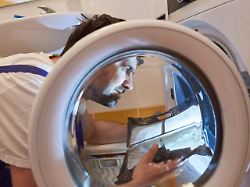Breakthrough achieved in Brussels
The right to repair should come across Europe
February 2, 2024, 2:12 a.m
Listen to article
This audio version was artificially generated. More info | Send feedback
After years of preliminary negotiations, an agreement has now been reached at EU level: manufacturers of electrical appliances and cell phones should be obliged to repair their devices. This should benefit consumers and the environment. The final agreement is considered a formality in Brussels.
A so-called right to repair for consumers is to be introduced at EU level. Negotiators from the European Parliament and the EU states agreed that night that manufacturers of certain products such as refrigerators, vacuum cleaners and cell phones will have to repair them upon request in the future, as the Belgian Council Presidency and the European Parliament’s chief negotiator, René Repasi, announced. For the first time, a legal right to repair so-called white goods – which primarily includes household appliances – and typical everyday products such as smartphones will be introduced, said SPD politician Repasi. In the future, it will be easier and cheaper to have products repaired instead of buying them new. “We can no longer afford to live in a throwaway society,” said Repasi. European consumers produce 35 million tons of waste every year because products are not repaired and replaced with new goods.
However, the new requirements do not apply to all products. According to the information, some goods such as headphones and furniture are excluded. A precise legal text is usually published a few weeks after the negotiators reach an agreement. Parliament and the EU states still have to agree to the compromise. In most cases this is just a formality.
The chairwoman of the EU Parliament’s Internal Market Committee, Anna Cavazzini, described the negotiation result as a breakthrough for consumer protection. “Repairs will become easier and more affordable by guaranteeing access to spare parts at a reasonable price and to repair instructions from the manufacturers, even for small repair shops around the corner and tinkerers in their garages,” said the Green politician.
Products must be designed to be repair-friendly
The agreement is based on a proposal that the EU Commission presented almost a year ago. According to its own information, the EU Parliament has been advocating the right to repair for more than ten years. In April 2022, Parliament increased the pressure and voted by a large majority to ensure that products are designed to last longer, can be repaired safely and their parts are easily accessible and removable.
In addition to consumers, the new rules are also intended to protect the environment. When presenting the project, the Commission argued that fewer products thrown away would mean both less waste and less use of resources in production. This would also result in fewer greenhouse gas emissions. Based on its proposal, the Commission estimated that 18.5 million tonnes of greenhouse gas emissions, 1.8 million tonnes of resources and 3 million tonnes of waste would be saved over 15 years.
